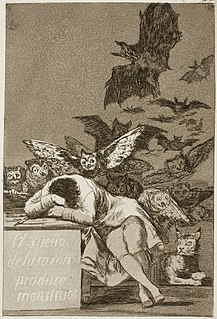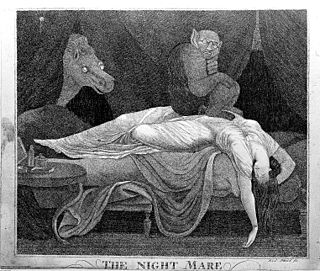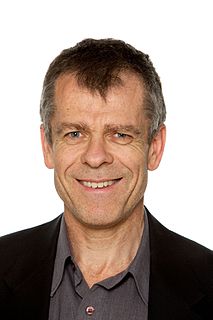Related Research Articles

A nightmare, also known as a bad dream, is an unpleasant dream that can cause a strong emotional response from the mind, typically fear but also despair, anxiety or great sadness. However, psychological nomenclature differentiates between nightmares and bad dreams; specifically, people remain asleep during bad dreams, whereas nightmares can awaken individuals. The dream may contain situations of discomfort, psychological or physical terror, or panic. After a nightmare, a person will often awaken in a state of distress and may be unable to return to sleep for a short period of time. Recurrent nightmares may require medical help, as they can interfere with sleeping patterns and cause insomnia.
Post-traumatic stress disorder (PTSD) is a mental and behavioral disorder that can develop because of exposure to a traumatic event, such as sexual assault, warfare, traffic collisions, child abuse, domestic violence, or other threats on a person's life. Symptoms may include disturbing thoughts, feelings, or dreams related to the events, mental or physical distress to trauma-related cues, attempts to avoid trauma-related cues, alterations in the way a person thinks and feels, and an increase in the fight-or-flight response. These symptoms last for more than a month after the event. Young children are less likely to show distress but instead may express their memories through play. A person with PTSD is at a higher risk of suicide and intentional self-harm.

Postpartum depression (PPD), also called postnatal depression, is a type of mood disorder associated with childbirth, which can affect both sexes. Symptoms may include extreme sadness, low energy, anxiety, crying episodes, irritability, and changes in sleeping or eating patterns. Onset is typically between one week and one month following childbirth. PPD can also negatively affect the newborn child.
Dissociation, as a concept that has been developed over time, is any of a wide array of experiences, ranging from a mild emotional detachment from the immediate surroundings, to a more severe disconnection from physical and emotional experiences. The major characteristic of all dissociative phenomena involves a detachment from reality, rather than a loss of reality as in psychosis.

Nightmare disorder, also known as dream anxiety disorder, is a sleep disorder characterized by frequent nightmares. The nightmares, which often portray the individual in a situation that jeopardizes their life or personal safety, usually occur during the REM stages of sleep. Though most people have experienced at least one nightmare during their life, subjects with nightmare disorder experience them with a greater frequency. The disorder's DSM-IV number is 307.47.
Eye movement desensitization and reprocessing (EMDR) is a form of psychotherapy in which the person being treated is asked to recall distressing images; the therapist then directs the patient in one type of bilateral stimulation, such as side-to-side eye movement or tapping either side of the body. EMDR was developed by Francine Shapiro starting in 1988. According to the 2013 World Health Organization (WHO) practice guideline: "This therapy [EMDR] is based on the idea that negative thoughts, feelings, and behaviors are the result of unprocessed memories. The treatment involves standardized procedures that include focusing simultaneously on (a) spontaneous associations of traumatic images, thoughts, emotions and bodily sensations and (b) bilateral stimulation that is most commonly in the form of repeated eye movements."
Biological psychiatry or biopsychiatry is an approach to psychiatry that aims to understand mental disorder in terms of the biological function of the nervous system. It is interdisciplinary in its approach and draws on sciences such as neuroscience, psychopharmacology, biochemistry, genetics, epigenetics and physiology to investigate the biological bases of behavior and psychopathology. Biopsychiatry is the branch of medicine which deals with the study of the biological function of the nervous system in mental disorders.
In medicine and psychology, emotional lability is a sign or symptom typified by exaggerated changes in mood or affect in quick succession. Sometimes the emotions expressed outwardly are very different from how the person feels on the inside. These strong emotions can be a disproportionate response to something that happened, but other times there might be no trigger at all. The person experiencing emotional lability usually feels like they do not have control over their emotions. For example, someone might cry uncontrollably in response to any strong emotion even if they do not feel sad or unhappy.
Military psychiatry covers special aspects of psychiatry and mental disorders within the military context. The aim of military psychiatry is to keep as many serving personnel as possible fit for duty and to treat those disabled by psychiatric conditions. Military psychiatry encompasses counseling individuals and families on a variety of life issues, often from the standpoint of life strategy counseling, as well as counseling for mental health issues, substance abuse prevention and substance abuse treatment; and where called for, medical treatment for biologically based mental illness, among other elements.
Prolonged exposure therapy (PE) is a form of behavior therapy and cognitive behavioral therapy designed to treat post-traumatic stress disorder. It is characterized by two main treatment procedures – imaginal and in vivo exposures. Imaginal exposure is repeated 'on-purpose' retelling of the trauma memory. In vivo exposure is gradually confronting situations, places, and things that are reminders of the trauma or feel dangerous. Additional procedures include processing of the trauma memory and breathing retraining.
Psychiatry is the medical specialty devoted to the diagnosis, prevention, and treatment of mental disorders. These include various maladaptations related to mood, behaviour, cognition, and perceptions. See glossary of psychiatry.

Yuval Neria is a Professor of Medical Psychology at the Departments of Psychiatry and Epidemiology at Columbia University Medical Center (CUMC), and Director of Trauma and PTSD Program, and a Research Scientist at the New York State Psychiatric Institute (NYSPI) and Columbia University Department of Psychiatry. He is a recipient of the Medal of Valor, Israel's highest decoration, for his exploits during the 1973 Yom Kippur War.

Sir Simon Charles Wessely is a British psychiatrist. He is Regius Professor of Psychiatry at the Institute of Psychiatry, King's College London and head of its department of psychological medicine, vice dean for academic psychiatry, teaching and training at the Institute of Psychiatry, as well as Director of the King's Centre for Military Health Research. He is also honorary consultant psychiatrist at King's College Hospital and the Maudsley Hospital, as well as civilian consultant advisor in psychiatry to the British Army. He was knighted in the 2013 New Year Honours for services to military healthcare and to psychological medicine. From 2014 to 2017, he was the elected president of the Royal College of Psychiatrists.
PTSD is a psychiatric disorder characterized by intrusive thoughts and memories, dreams, or flashbacks of the event; avoidance of people, places, and activities that remind the individual of the event; ongoing negative beliefs about oneself or the world, mood changes, and persistent feelings of anger, guilt, or fear; alterations in arousal such as increased irritability, angry outbursts, being hypervigilant, or having difficulty with concentration and sleep. PTSD is commonly treated with various types of psychotherapy and pharmacotherapy.
Childbirth-related post-traumatic stress disorder is a psychological disorder that can develop in women who have recently given birth. Its symptoms are not distinct from post-traumatic stress disorder (PTSD).

Richard Allan Bryant is an Australian medical scientist. He is Scientia Professor of Psychology at the University of New South Wales (UNSW) and director of the UNSW Traumatic Stress Clinic, based at UNSW and Westmead Institute for Medical Research. His main areas of research are posttraumatic stress disorder (PTSD) and prolonged grief disorder. On 13 June 2016 he was appointed a Companion of the Order of Australia (AC), for eminent service to medical research in the field of psychotraumatology, as a psychologist and author, to the study of Indigenous mental health, as an advisor to a range of government and international organisations, and to professional societies.

MDMA-assisted psychotherapy is the use of prescribed doses of MDMA as an adjunct to psychotherapy sessions. Research suggests that MDMA-assisted psychotherapy for post-traumatic stress disorder (PTSD), including Complex PTSD, might improve treatment effectiveness. In 2017, a Phase II clinical trial led to "breakthrough therapy" designation by the US Food and Drug Administration (FDA).

Damon Scott Tweedy is an American physician who is an associate professor of psychiatry and behavioral sciences at the Duke University School of Medicine. In 2015 Tweedy published his memoir, Black Man in a White Coat: A Doctor's Reflections on Race and Medicine.
Psychological trauma in older adults is the overall prevalence and occurrence of trauma symptoms within the older adult population. Although there is a 90% likelihood of an older adult experiencing a traumatic event, there is a lack of research on trauma in older adult populations. This makes research trends on the complex interaction between traumatic symptom presentation and specific older adult population considerations difficult to pinpoint. This article reviews the existing literature and briefly introduces the various ways psychological trauma impacts the older adult population.

Helena Hansen is an American psychiatrist who is a professor and Chair of Translational Social Science at University of California, Los Angeles. Her research considers health equity, and has called for clinical practitioners to address social determinants of health. She holds an Honorary Doctorate from the Icahn School of Medicine at Mount Sinai and was elected Fellow of the National Academy of Medicine in 2021.
References
- ↑ "OU College of Medicine > Academic Departments > Psychiatry and Behavioral Sciences > Terrorism and Disaster Center > About". medicine.ouhsc.edu.
- ↑ "Betty Pfefferbaum". Dart Center. 17 December 2012.
- ↑ "Betty Pfefferbaum | START.umd.edu". www.start.umd.edu.
- ↑ "OBA Member Search". Oklahoma Bar Association. 30 August 2018.